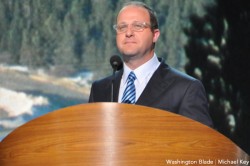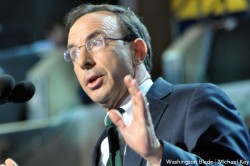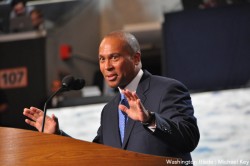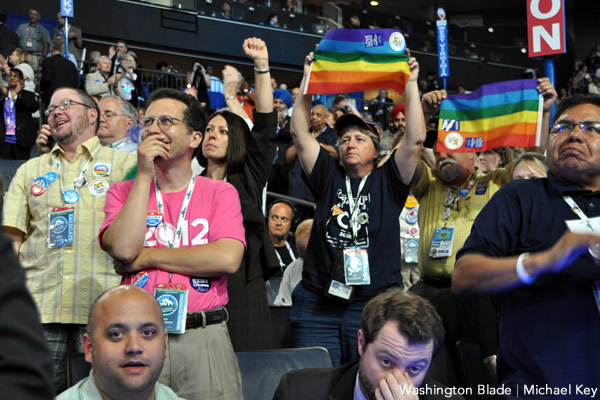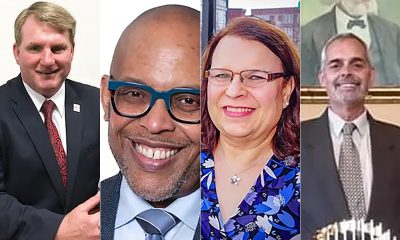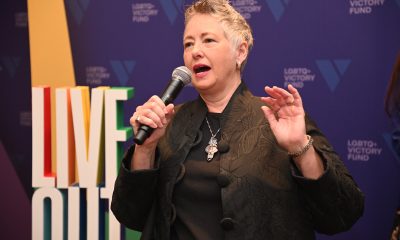National
DNC 2012: Gay speakers, issues pervade convention
Delegates approve platform backing marriage equality
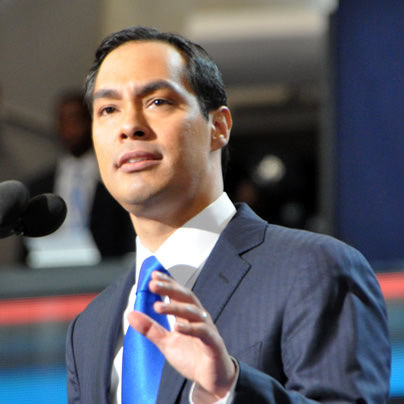
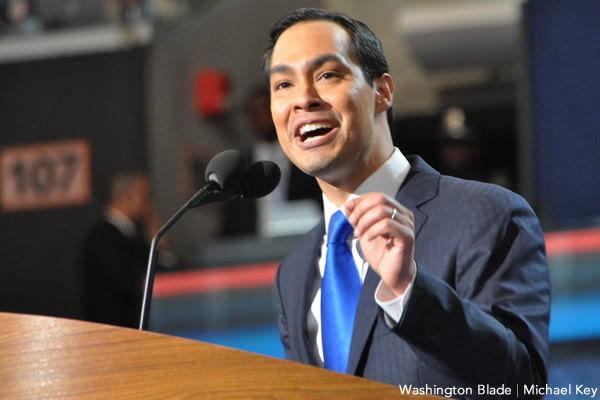
San Antonio Mayor Julian Castro dinged Mitt Romney at the Democratic National Convention for his opposition to marriage equality (Blade photo by Michael Key)
CHARLOTTE, N.C. — The first official day of the Democratic National Convention showcased the party’s solidarity with the LGBT community as speakers — including several openly gay Democrats — took to the podium to voice support and delegates approved for the first time a platform that endorses marriage equality.
Capping off the evening were high-profile speeches from San Antonio Mayor Julian Castro, who’s considered a rising star in the Democratic Party and possibly a contender for the next governor of Texas, and first lady Michelle Obama. Both mentioned LGBT rights in their speeches to attendees at the Time Warner Cable Arena.
Castro made a reference to marriage equality when reciting a list of issues supported by Democrats, but opposed by Republican presidential nominee Mitt Romney. The GOP candidate is against same-sex marriage and has endorsed a Federal Marriage Amendment.
“When it comes to getting the middle class back to work, Mitt Romney says, ‘No,'” Castro said. “When it comes to respecting women’s rights, Mitt Romney says, ‘No.’ When it comes to letting people marry whomever they love, Mitt Romney says, ‘No.'”
Castro continued that Romney also says “no” to expanding access to health care for all Americans, but noted Romney originally said “yes” to that — an allusion to the health care reform Romney helped pass into law as the Massachusetts governor. Castro added, “Gov. Romney has undergone an extreme makeover, and it ain’t pretty.”
The San Antonio mayor’s speech was a hit among attendees at the convention, who held up signs reading “Opportunity” and “Oportunidad” as he spoke.
Michelle Obama delivered a speech that was more personal, emphasizing her husband’s commitment to his family despite her concerns upon taking office about the sacrifices about what being president meant for their two daughters.
“But today, I have none of those worries from four years ago about whether Barack and I were doing what’s best for our girls,” Michelle Obama said. “Because today, I know from experience that if I truly want to leave a better world for my daughters, and all our sons and daughters … then we must work like never before, and we must once again come together and stand together for the man we can trust to keep moving this great country forward, my husband, our president, President Barack Obama.”
Michelle Obama also hit on her husband’s support for LGBT rights during her remarks when she spoke of his commitment to the people of diverse backgrounds, saying “Barack knows the American Dream because he’s lived it — and he wants everyone in this country to have that same opportunity, no matter who we are, or where we’re from, or what we look like, or who we love.”
The first lady’s speech was widely seen as successful. Attendees at the convention held up slim, vertical signs reading, “We love Michelle Obama” and cheered as she spoke.
Jerame Davis, executive director of the National Stonewall Democrats, noted Michelle Obama’s speech when talking about how Tuesday night at the Democratic convention strongly contrasted with “last week’s Republican hate-fest” in Tampa.
“First Lady Michelle Obama was inspirational and gave us a glimpse of the love she has for her family,” Davis said. “She is the heart and soul of the first family and that was on full display tonight.”
In a historic development, the 5,963 delegates to the convention approved a Democratic platform that for the first time includes a plank supporting marriage equality. Language in the platform also rejects the Defense of Marriage Act and affirms support for the Employment Non-Discrimination Act.
New Jersey Mayor Cory Booker, a co-chair of the platform committee, said prior to the final approval the manifesto embodies the principles of the Democratic Party, including the notion that individuals should be able to pursue the American dream regardless of, among other factors, whom they love.
“This platform of big and practical ideas sets forth an emboldened pathway toward the historic hope which has driven generations of Americans forward,” Booker said. “It is our most fundamental national aspiration—that no matter who you are, no matter what your color, creed, how you choose to pray or who you choose to love, that if you are an American — first generation or fifth — one who is willing to work hard, play by the rules and apply your God-given talents—that you should be able to find a job that pays the bills.”
Delegates approved the platform by a loud voice vote when Democratic National Committee Chair and Los Angeles Mayor Antonio Villaraigosa asked for “yays” and “nays” to accept the manifesto. No one was heard voicing objection to the platform when Villaraigosa asked for the “nays.”
In addition to the high-profile speeches at the end of the evening, at least four openly gay speakers were among those delivering remarks from the podium. Democratic National Committee Treasurer Andrew Tobias, Democratic National Convention Committee CEO Stephen Kerrigan and Service Employees International Union Mary Kay Henry and U.S. Rep. Jared Polis (D-Colo.) delivered remarks.
A primetime speaking slot was awarded to Polis, who is slated to become the most senior openly gay member in the lower chamber of Congress upon the start of next year after Reps. Barney Frank (D-Mass.) and Tammy Baldwin (D-Wis.) finish their final terms as U.S. House members.
Polis wasn’t shy about talking about his sexual orientation during his speech. He declared he was gay among other things upon taking the stage, saying, “My name is Jared Polis. My great-grandparents were immigrants. I am Jewish. I am gay. I am a father. I am a son. I am an entrepreneur. I am a congressman from Colorado. I am always an optimist. But first and foremost, I am an American.”
The first openly gay parent to serve in Congress, Polis mentioned his partner, Marlon Reis, by name while emphasizing respect for diversity — for people who may identify as LGBT and others who hold views that are either conservative or progressive.
“So tonight, I don’t just ask my fellow Americans to respect my relationship with my partner Marlon and my role as a father to our son,” Polis said. “I also ask them to respect the Christian family concerned about decaying moral values and crass commercialism. I ask them to respect the difficult decision of a single mother to bring a child into this world, because of her heartfelt beliefs.”
Polis mentioned some of Obama’s pro-LGBT initiatives that he said demonstrates the president’s understanding that progress can only be achieved by working together.
“It is why he repealed ‘Don’t Ask, Don’t Tell,’ so that no person is prevented from serving the country they love because of whom they love,” Polis said. “And it is why Barack Obama became the first sitting president in American history to show his personal support for same-sex marriage.”
Tobias, who spoke earlier in the day, said his speech marked the fourth time he’s addressed a Democratic National Convention and noted each time he’s made an address he talks about two things: money and equality.
Praising Obama for his work over his first term, Tobias said the administration has “dramatically improved” the lives of millions of LGBT Americans and “at no cost” to anyone else.
Tobias also offered a personal anecdote about being gay as a way to demonstrate the tremendous progress that has been made on LGBT rights in the past few decades.
“In college, I thought I was the only guy in the world who liked other guys,” Tobias said. “Later I found there was someone else like me, our 26-year-old resident tutor. He and I never talked about it at the time. No one talked about being gay back then. People killed themselves over being gay. Tragically, some kids still do.”
Tobias later revealed the identity of that resident tutor, saying he wed another man at a wedding just eight weeks ago, where love that was “unspeakable” nearly a half-century ago was celebrated “by hundreds of people — straight and gay, surfers and senators.”
“In a way, it was a wedding that married my two topics — money and equality — because that young tutor had grown up to become the chairman of the House Financial Services Committee: Barney Frank,” Tobias said.
Kerrigan, who was charged with managing the convention, made no explicit mention of his sexual orientation or LGBT issues during his speech and instead talked about the opportunities at the convention and access through digital media. Neither did SEIU’s Henry, who focused on labor issues while criticizing Romney, saying “Time after time, working families have paid the price for Mitt Romney’s success.”
Many other speakers throughout the evening also hit on LGBT rights as they praised President Obama. They include U.S. Senate candidate Tim Kaine, who said Obama kept his commitment to “fair treatment for LGBT Americans.” Recognition of Obama’s push to end “Don’t Ask, Don’t Tell” came in addition to Polis from Massachusetts Gov. Deval Patrick; platform committee co-chair and first woman to reach the rank of three-star general in the Army, retired Lt. Gen. Claudia Kennedy; U.S. House candidate Tammy Duckworth; Chicago Mayor Rahm Emanuel; Maya Soetoro-Ng, Obama’s sister; and actor and former White House official Kal Penn.
Richard Socarides, a gay delegate from New York City and former adviser to President Clinton on LGBT rights, said the developments at the convention added up to “a historic night” for the LGBT community and “a great night for our party.”
“Our platform plank was adopted plus every speaker seemed so proud to be the party of all America, including us,” Socarides said. “I thought — we are part of this party’s vision of America.”
The pro-LGBT developments came in stark contrast to last week’s Republican National Convention, when no openly speaker was at the podium and speakers advocated for traditional marriage. Delegates in Tampa also approved a platform limiting marriage to one man, one woman and endorsing a Federal Marriage Amendment.
Jimmy LaSalvia, executive director of the gay conservative group GOProud, nonetheless was dismissive of what happened on the first night of the Democratic convention.
“Nothing that they could put in the platform would do anything to cover up President Obama’s disastrous record on jobs and the economy,” LaSalvaia said. “All the openly gay speakers and wonderful feel-good platform language won’t change the fact that, just like everyone else in America, gay people aren’t any better off than they were four years ago.”
Federal Government
Lambda Legal praises Biden-Harris administration’s finalized Title IX regulations
New rules to take effect Aug. 1

The Biden-Harris administration’s revised Title IX policy “protects LGBTQ+ students from discrimination and other abuse,” Lambda Legal said in a statement praising the U.S. Department of Education’s issuance of the final rule on Friday.
Slated to take effect on Aug. 1, the new regulations constitute an expansion of the 1972 Title IX civil rights law, which prohibits sex-based discrimination in education programs that receive federal funding.
Pursuant to the U.S. Supreme Court’s ruling in the landmark 2020 Bostock v. Clayton County case, the department’s revised policy clarifies that discrimination on the basis of sexual orientation and gender identity constitutes sex-based discrimination as defined under the law.
“These regulations make it crystal clear that everyone can access schools that are safe, welcoming and that respect their rights,” Education Secretary Miguel Cardona said during a call with reporters on Thursday.
While the new rule does not provide guidance on whether schools must allow transgender students to play on sports teams corresponding with their gender identity to comply with Title IX, the question is addressed in a separate rule proposed by the agency in April.
The administration’s new policy also reverses some Trump-era Title IX rules governing how schools must respond to reports of sexual harassment and sexual assault, which were widely seen as imbalanced in favor of the accused.
Jennifer Klein, the director of the White House Gender Policy Council, said during Thursday’s call that the department sought to strike a balance with respect to these issues, “reaffirming our longstanding commitment to fundamental fairness.”
“We applaud the Biden administration’s action to rescind the legally unsound, cruel, and dangerous sexual harassment and assault rule of the previous administration,” Lambda Legal Nonbinary and Transgender Rights Project Director Sasha Buchert said in the group’s statement on Friday.
“Today’s rule instead appropriately underscores that Title IX’s civil rights protections clearly cover LGBTQ+ students, as well as survivors and pregnant and parenting students across race and gender identity,” she said. “Schools must be places where students can learn and thrive free of harassment, discrimination, and other abuse.”
Michigan
Mich. Democrats spar over LGBTQ-inclusive hate crimes law
Lawmakers disagree on just what kind of statute to pass

Michigan could soon become the latest state to pass an LGBTQ-inclusive hate crime law, but the state’s Democratic lawmakers disagree on just what kind of law they should pass.
Currently, Michigan’s Ethnic Intimidation Act only offers limited protections to victims of crime motivated by their “race, color, religion, gender, or national origin.” Bills proposed by Democratic lawmakers expand the list to include “actual or perceived race, color, religion, gender, sexual orientation, gender identity or expression, ethnicity, physical or mental disability, age, national origin, or association or affiliation with any such individuals.”
Democratic Gov. Gretchen Whitmer and Attorney General Dana Nessel have both advocated for a hate crime law, but house and senate Democrats have each passed different hate crimes packages, and Nessel has blasted both as being too weak.
Under the house proposal that passed last year (House Bill 4474), a first offense would be punishable with a $2,000 fine, up to two years in prison, or both. Penalties double for a second offense, and if a gun or other dangerous weapons is involved, the maximum penalty is six years in prison and a fine of $7,500.
But that proposal stalled when it reached the senate, after far-right news outlets and Fox News reported misinformation that the bill only protected LGBTQ people and would make misgendering a trans person a crime. State Rep. Noah Arbit, the bill’s sponsor, was also made the subject of a recall effort, which ultimately failed.
Arbit submitted a new version of the bill (House Bill 5288) that added sections clarifying that misgendering a person, “intentionally or unintentionally” is not a hate crime, although the latest version (House Bill 5400) of the bill omits this language.
That bill has since stalled in a house committee, in part because the Democrats lost their house majority last November, when two Democratic representatives resigned after being elected mayors. The Democrats regained their house majority last night by winning two special elections.
Meanwhile, the senate passed a different package of hate crime bills sponsored by state Sen. Sylvia Santana (Senate Bill 600) in March that includes much lighter sentences, as well as a clause ensuring that misgendering a person is not a hate crime.
Under the senate bill, if the first offense is only a threat, it would be a misdemeanor punishable by one year in prison and up to $1,000 fine. A subsequent offense or first violent hate crime, including stalking, would be a felony that attracts double the punishment.
Multiple calls and emails from the Washington Blade to both Arbit and Santana requesting comment on the bills for this story went unanswered.
The attorney general’s office sent a statement to the Blade supporting stronger hate crime legislation.
“As a career prosecutor, [Nessel] has seen firsthand how the state’s weak Ethnic Intimidation Act (not updated since the late 1980’s) does not allow for meaningful law enforcement and court intervention before threats become violent and deadly, nor does it consider significant bases for bias. It is our hope that the legislature will pass robust, much-needed updates to this statute,” the statement says.
But Nessel, who has herself been the victim of racially motivated threats, has also blasted all of the bills presented by Democrats as not going far enough.
“Two years is nothing … Why not just give them a parking ticket?” Nessel told Bridge Michigan.
Nessel blames a bizarre alliance far-right and far-left forces that have doomed tougher laws.
“You have this confluence of forces on the far right … this insistence that the First Amendment protects this language, or that the Second Amendment protects the ability to possess firearms under almost any and all circumstances,” Nessel said. “But then you also have the far left that argues basically no one should go to jail or prison for any offense ever.”
The legislature did manage to pass an “institutional desecration” law last year that penalizes hate-motivated vandalism to churches, schools, museums, and community centers, and is LGBTQ-inclusive.
According to data from the U.S. Department of Justice, reported hate crime incidents have been skyrocketing, with attacks motivated by sexual orientation surging by 70 percent from 2020 to 2022, the last year for which data is available.
Twenty-two states, D.C., Puerto Rico, and the U.S. Virgin Islands have passed LGBTQ-inclusive hate crime laws. Another 11 states have hate crime laws that include protections for “sexual orientation” but not “gender identity.”
Michigan Democrats have advanced several key LGBTQ rights priorities since they took unified control of the legislature in 2023. A long-stalled comprehensive anti-discrimination law was passed last year, as did a conversion therapy ban. Last month the legislature updated family law to make surrogacy easier for all couples, including same-sex couples.
A bill to ban the “gay panic” defense has passed the state house and was due for a Senate committee hearing on Wednesday.
Indiana
Drag queen announces run for mayor of Ind. city
Branden Blaettne seeking Fort Wayne’s top office

In a Facebook post Tuesday, a local drag personality announced he was running for the office of mayor once held by the late Fort Wayne Mayor Tom Henry, who died last month just a few months into his fifth term.
Henry was recently diagnosed with late-stage stomach cancer and experienced an emergency that landed him in hospice care. He died shortly after.
WPTA, a local television station, reported that Fort Wayne resident Branden Blaettne, whose drag name is Della Licious, confirmed he filed paperwork to be one of the candidates seeking to finish out the fifth term of the late mayor.
Blaettner, who is a community organizer, told WPTA he doesn’t want to “get Fort Wayne back on track,” but rather keep the momentum started by Henry going while giving a platform to the disenfranchised groups in the community. Blaettner said he doesn’t think his local fame as a drag queen will hold him back.
“It’s easy to have a platform when you wear platform heels,” Blaettner told WPTA. “The status quo has left a lot of people out in the cold — both figuratively and literally,” Blaettner added.

The Indiana Capital Chronicle reported that state Rep. Phil GiaQuinta, who has led the Indiana House Democratic caucus since 2018, has added his name to a growing list of Fort Wayne politicos who want to be the city’s next mayor. A caucus of precinct committee persons will choose the new mayor.
According to the Fort Wayne Journal Gazette, the deadline for residents to file candidacy was 10:30 a.m. on Wednesday. A town hall with the candidates is scheduled for 6 p.m. on Thursday at Franklin School Park. The caucus is set for 10:30 a.m. on April 20 at the Lincoln Financial Event Center at Parkview Field.
At least six candidates so far have announced they will run in the caucus. They include Branden Blaettne, GiaQuinta, City Councilwoman Michelle Chambers, City Councilwoman Sharon Tucker, former city- and county-council candidate Palermo Galindo, and 2023 Democratic primary mayoral candidate Jorge Fernandez.
-

 District of Columbia2 days ago
District of Columbia2 days agoReenactment of first gay rights picket at White House draws interest of tourists
-

 District of Columbia2 days ago
District of Columbia2 days agoNew D.C. LGBTQ+ bar Crush set to open April 19
-

 Arizona2 days ago
Arizona2 days agoAriz. governor vetoes anti-transgender, Ten Commandments bill
-

 Africa4 days ago
Africa4 days agoUgandan activists appeal ruling that upheld Anti-Homosexuality Act


